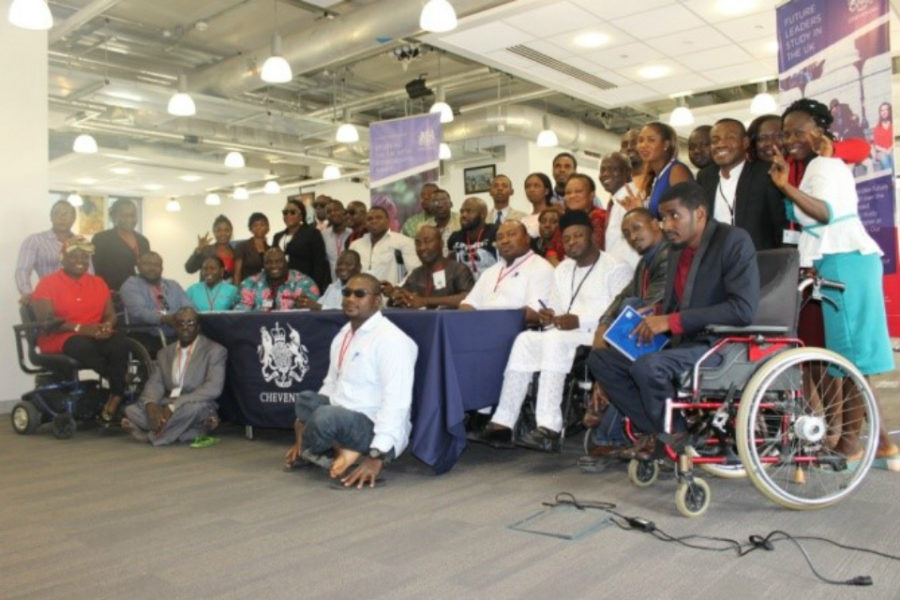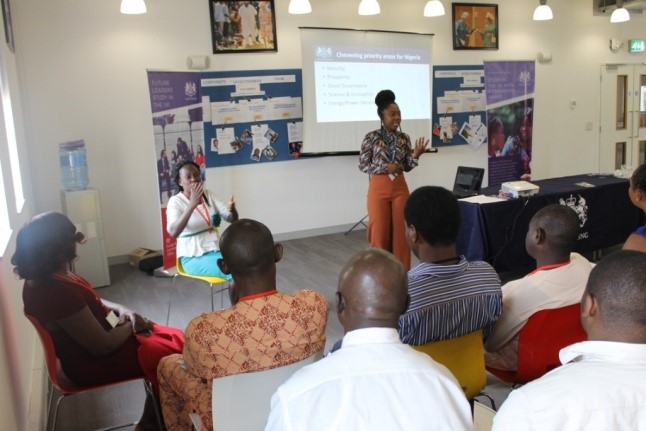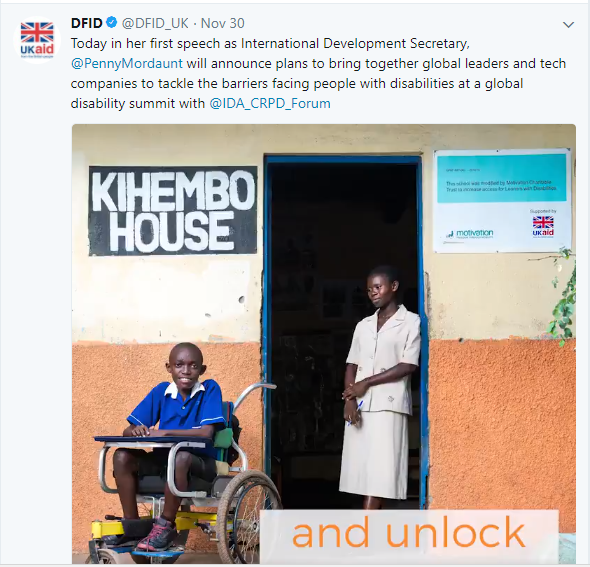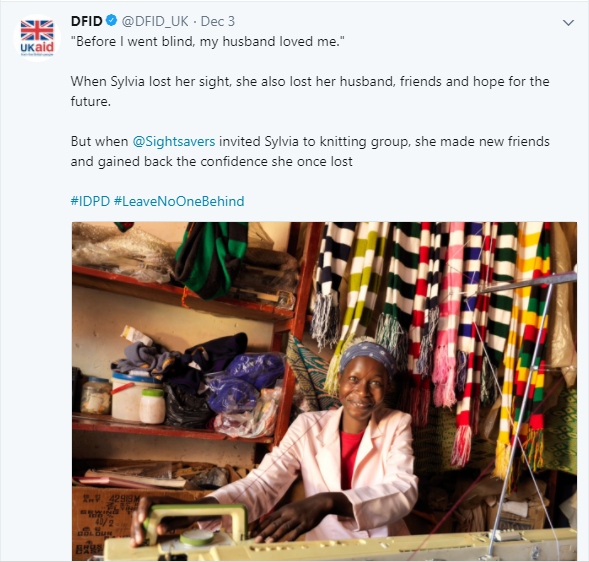22nd February 2018 Abuja, Nigeria
Disability inclusion begins with You and I

I recently organised a targeted Chevening Scholarship application workshop for Persons with Disabilities (PWDs). Chevening is a holistic UK government funded scheme that prepares talented individuals for the future leadership of Nigeria, through a cultural exchange and master’s degree programme in the UK. The workshop was hosted in collaboration with the Christian Blind Mission (CBM) Country Office and a Chevening alumnus – Dr. Israel Balogun (a physically challenged Disability Inclusive Development advisor). Our aim was to promote the fair and disability inclusive programming of Chevening by encouraging applications from qualified members of the disability communities in Abuja. I took participants through strategies and essential soft skills required to submit quality applications, succeed at the interviews and access inclusive education in the UK. Being a first-time experience training a group with diverse special needs, I found the planning process very eye-opening and educative. I had to ensure that reasonable accommodation was available to participants; for access into the relevant parts of the building, use of essential comfort facilities, sign language interpreters etc.

Based on this experience, I was able to better understand the challenges faced by PWDs, especially in a society where necessary accommodation is not readily available. I remember passing through a Nigerian university, with no provision of facilities or assistive technology for PWDs to access lecture rooms on the 3rd floor, fully participate in lectures or move freely around campus. In spite of these limitations, their drive and aspirations were extremely inspirational. Some participants based outside Abuja actually travelled to attend the workshop without sponsorship. They had strived to achieve so much with so little resources and opportunities; some possessing university degrees with 2:1 honours, masters’ degrees, successful careers in public service and business. As I pushed participants on manual wheelchairs up the disability access ramp of the building and helped open doors for some others; I became troubled with four questions – who ensures that the relevant doors remains widely open for these group of citizens? How have they managed to cope so far? How do they still have the drive to dream so big? What more can we do?
In line with the Sustainable Development Goals (SDGs), we all have a role to play in ensuring that no one is left behind. But, it is the government’s duty to create an enabling environment and also ensure the compliance of private entities to inclusive policies. I was so excited to learn that that the UK government, through DFID, is starting to put disability at the heart of its development agenda and will be hosting its first ever Global Disability Summit in June 2018. Penny Mordaunt, recently made this announcement and reiterated her commitment to disability inclusive development in her first speech as International Development Secretary. Similarly, the Nigerian government hosted a side event at the 72nd session at of the UN General Assembly (UNGA) tagged: ‘Localising SDGs Through Partnership Innovation and Resource Mobilisation’. I commend both the UK and Nigeria’s commitment to the SDGs and we must be ready to walk the talk. We must recognise the importance of empowering advocates with a disability and leveraging partnerships for the achievement of the goals (SDG 17).

Every day, PWDs living in Nigeria are faced with various barriers limiting their full integration into the society. It is a fundamental human right for everyone, regardless of their disability status, to have access to equal and equitable opportunities. This implies the right to live independently according to acceptable standards and fully participate in the socio-economic development of host societies. Access refers to the provision of physical or virtual flexible facilities and environments to aid the inclusion of PWDs in our societies (SDG 11); therefore accessibility is a precondition for inclusion. Participants at the workshop stressed that they didn’t want to be perceived as a vulnerable group but rather, as a resource group who can effectively contribute to national development – if given the opportunity and enabling environment to participate fully. Inclusive development gives PWDs some of these opportunities, in addition to a means to maintain a decent standard of living for themselves and their families. Disability often leads to poverty as PWDs may lack access to education and skills development opportunities, thus reducing or eliminating their chances of engaging in gainful employment. Research shows that PWDs are often times discouraged by discriminatory barriers or assumptions about their capacity to work; thereby causing them to withdraw from active search for educational or career opportunities. Poverty could also lead to disability especially for persons with limited access to healthcare which results in the deterioration of treatable health conditions into permanent disabilities.

It is our duty as citizens to hold governments at all levels accountable; to ensure that strategies and policies to address barriers to inclusion are in place and implemented. At the federal level in Nigeria, disability affairs fall within the jurisdiction of the Ministry of Women Affairs. If well managed, there is a positive angle to this arrangement; as it also directly captures the plights of another unique group – “women with disabilities”. However, disability is a cross-cutting human right and development issue and should be mainstreamed across several other ministries i.e. Ministries of Education, Transport, Planning, Health etc. An enabling legal framework and adequate funding is also paramount to achieving disability inclusive development. Unfortunately, Nigeria is still yet to sign the 2015 Disability Bill into law and the ministry of women affairs is quite underfunded.

It is evident that there is still a long way to go in achieving disability inclusive development in Nigeria; however, inclusion must begin with each one of us. I remain committed to this cause and I am backing up my advocacy for better equity with deliberate actions. In addition to my first-ever training and mentoring of PWDs, I have championed the inclusion of an assessment criterion that specifically identifies deserving PWDs in the Chevening selection process for Nigeria.
What will you do to help people with disabilities?

Awesome stuff Jibeke. Wiil take a leaf and tailor make our own in Zambia!
Well done Jibike. Great that we are considering people with disability because Chevening is an opportunity for all!
Thanks Wale, your support has been very helpful.
Thanks for writing this Jibike. This is an area we can probably all do more on, personally and professionally. As DFID Nigeria we will be supporting disabled peoples groups to work with the Ministry of Womens Affairs and Social Development and other parts of government (eg education) to prepare commitments for the Disability Summit, working with Sightsavers and some of our prgorammes including our PERL governance programme. If anyone would like to be involved in this work please contact Esther Ali.
Thanks Oliver for your support on this project, with interviews and all. I would love to be involved in the preparations for the summit and will be in touch with Esther, grateful for the information.
Very informative and inspiring! Lot of work to be done but this is certainly a case of actively moving in the right direction. Best wishes.
Thanks Wayne!
This is a really touching piece. I must commend your efforts as individuals with disabilities really dont get the support they need in Nigeria. Its hard enough for individuals without disabilities to cope, so go figure! I have a 15 year old son with disabilities so your article hit close to home as one of my main concerns is how he will cope later on in life. Thanks and do keep up the good work
Thanks Wilson. It’s a good thing that the international community is beginning to take greater action to prioritise disability issues, very soon this will trickle down to Nigeria. I am positive that your son will be just fine.